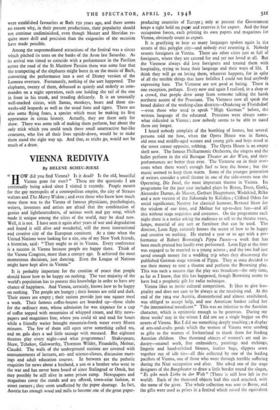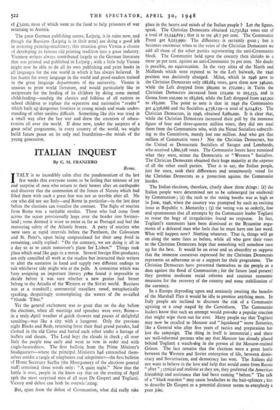VIENNA REDIVIVA
By HELENE SCHEU-RIESZ
"HOW did you find Vienna? Is it dead? Is the old, beautiful Vienna gone for ever?" These are the questions I am continually being asked since I visited it recently. People mourn for the gay metropolis of a cosmopolitan empire, the city of Strauss waltzes and The Merry Widow ; and even those who knew how much more there was to the Vienna of famous. physicians, psychologists, writers, inventors and artists are afraid that the combination of genius and lightheartedness, of serious work and gay song, which made it unique among the cities of the world, may be dead now. Well, it is not. I have seen it again after years of war and degradation and found it still alive and wonderful, still the most international and creative city of the European continent. At a time when the United Nations were looking for a site, one of my New York friends, a historian, said: "They ought to sit in Vienna. Every conference is a success in Vienna because people are happy there. Think of the Vienna Congress, more than a century ago. It achieved the most momentous decisions, just dancing. Even the League of Nations might have kept alive in. Vienna."
It is probably important for the creation of peace that people should know how to be happy on nothing. The vast majority of the world's population has to possess this knowledge in order to have any chance of happiness. And Vienna, certainly, knows how to be happy on nothing. The people are hungry ; their houses are cold and dark. Their stores are empty ; their rations provide just one square meal a week. Their famous coffee-houses are boarded up—those clubs for the ordinary man, whose admission fee was sixpence for a cup of coffee topped with mountains of whipped cream, and fifty news- papers and magazines free, where you could sit and read for hours while a friendly waiter brought mountain-fresh water every fifteen minutes. The few of them still open serve something called tea, and on gala days a sad little sausage with mustard. But eighteen theatres play every night—and what programmes! Shakespeare, Shaw, Tchekov, Galsworthy, Thornton Wilder, Pirandello, Molnar, Claudel. The walls of the underground stations are covered with announcements of lectures, art- and science-classes, discussion meet- ings and adult education courses. In between are the pathetic enquiries for news about a husband, a son or a brother who went to the war and has never been heard of since Stalingrad or Omsk, but may possibly be still alive in some prison camp. Newspapers and magazines cover the stands and are offered, town-crier fashion, at street corners ; they seem unaffected by the paper shortage. In fact, Austria has enough wood and mills to become one of the great paper- producing countries of Europe ; only at present the Government keeps a tight hold on paper and reserves it for export. And the four occupation forces, each printing its own papers and magazines for Vienna, obviously count as export.
It is gratifying to hear so many languages spoken again in the streets of this polyglot city—and nobody ever resenting it. Nobody resents foreigners in Vienna. There are other cities just as full of foreigners, where they are catered for and yet not loved at all. But the Viennese always did love foreigners and treated them with hospitality, trying to learn their language and their ways of life. I think they will go on loving them, whatever happens, for in spite of all the terrible things that have befallen I could not find anybody expressing hate. The Viennese are not good at hating. There is one exception, perhaps. Every now and again I realised, in a shop or a crowd, that people drew away from someone talking the harsh northern accent of the Prussians. The Viennese now all speak the broad dialect of the working-class districts—Ottakring or Floridsdorf —even those who used to speak "High German" before, the written language of the educated. Prussians were always some- what ridiculed in Vienna ; now nobody seems to be able to stand them any longer.
I heard nobody complain of the bombing of homes, but several persons told me how, when the Opera House was in flames, old men and middle-aged women and young girls and boys stood at the street corner opposite, sobbing. The Opera House is an empty shell now. The famous Philharmonic Orchestra, the singers and the ballet perform in the old Baroque Theater an der Wien, and their performances are better than ever. The Viennese sat in their over- coats when there wasn't enough fuel to heat the house ; but the music seemed to keep them warm. Some of the younger generation of writers consider a small theatre in one of the side-streets near the Opernring, Die Insel, the most important theatre in Vienna. Its programme for the past year included plays by Byron, Ibsen, Gorki, Alexandre Dumas, de Musset, Gerhart Hauptmann, Wedekind, Rilke and a new version of the Scikuntala by Kilidasa ; Clifford Odets for social significance, Nestroy for classical humour, Bernard Shaw for the wisdom of our time, and Molnar for up-to-date fun—and all this without stage requisites and costumes. On the programme each night there is a notice asking the audience to sell to the theatre vases, lamps, material of any sort or furniture that can be used. The director, Leon Epp, certainly knows the secret of how to be happy and creative on nothing. He started a year or so ago with a per- formance of Robert Browning's Pip pa Passes—a work that has been much praised but hardly ever performed. Leon Epp at the time was engaged to be married to a young actress ; and the two had just saved enough money for a wedding trip when they discovered the published German stage version of Pippa. They at once decided to use their money to rent a theatre and perform the Browning play. This was such a success that the play was broadcast—the only time, as far as I know, that this has happened, though Browning seems to have had a prophetic gift for radio technique.
Vienna likes to invite cultural competition. It likes to give hos- pitality and does not care to be always at the receiving end. At the end of the 1914 war Austria, dismembered and almost annihilated, was obliged to accept help, and one American banker called her "the international mendicant." This was an injustice to the Austrian character, which is optimistic enough to be generous. During my three weeks' stay in the winter I did not see a single beggar on the streets of Vienna. But I did see something deeply touching ; a display of arts-and-crafts goods which the women of Vienna were sending as gifts to the women of Switzerland to thank them for feeding Austrian children. One thousand objects of women's art and in- dustry—enamel work, fine embroidery, paintings and etchings, lingerie and hand-stitched blouses, leather bags, slippers sewn together out of silk ties—all this collected by one of the leading pacifists of Vienna, one of those who went through terrible suffering during the Nazi occupation and after. She asked one of the stage designers of the Burgtheater to draw a little border round the slogan, "Es gibt noch Liebe in der Welt" (There is still love left in the world). Each of the thousand objects had this card attached, with the name of the giver. The whole collection was sent to Berne, and the gifts were used as prizes in a festival which raised the equivalent,
of L3,00o, most of which went to the fund to help prisoners of war returning to Austria.
The great German publishing centre, Leipzig, is in ruins now, and though the Russians (Leipzig is in their zone) are doing a good job in restoring printing-machinery, this situation gives Vienna a chance of developing its famous old printing tradition into a great industry. Viennese writers always contributed largely to the German literature that was printed and published in Leipzig ; with a little help Vienna might now be able to do all its own publishing and print books in all languages for the one world in which it has always believed. It has founts for every language in the world and proof-readers trained in the great language departments of the university. Vienna is anxious to print world literature, and would particularly like to reciprocate for the feeding of its children by doing some mental child-feeding—sendirig the classics and folklore of all nations to school children to replace the separatist and nationalist "reader" which built up dangerous frontiers in young minds and made under- standing of other natilms difficult. Something like this was tried in a small way after the last war and drew the attention of educa- tionists all over the world. If done now, under the auspices of a great relief programme, in every country of the world, we might build future peace on its only real foundation—the minds of the young generation.































 Previous page
Previous page